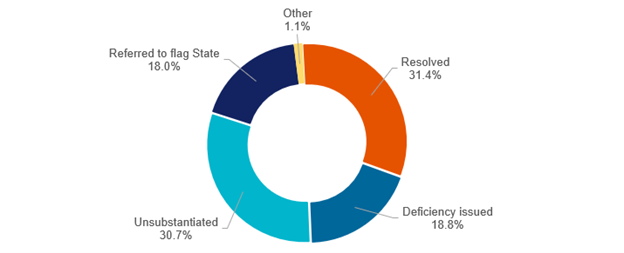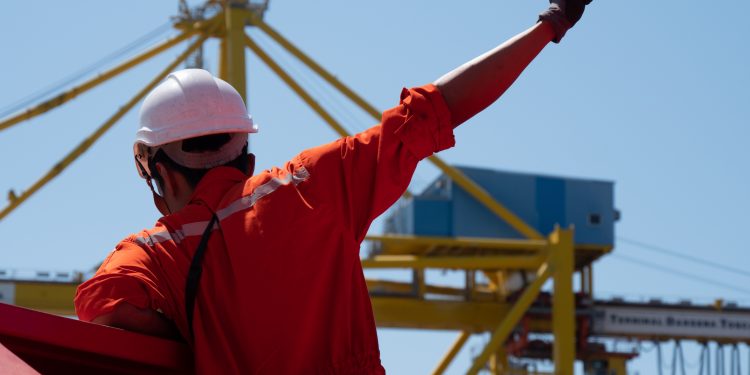In the 2022 Australian Maritime Labour Convention, 2006 (MLC) annual report, AMSA presents an analysis of MLC complaints, compliance and follow-up actions undertaken by AMSA in Australia for 2022.
Every year AMSA undertakes a range of planned and responsive activities to keep people safe and to protect the marine environment which is outlined in the National Compliance Plan.
MLC complaints received
In 2022, AMSA received 261 complaints representing a 6.8 per cent decrease on the number received in 2021 (280) which has continued to decline from the peak of 320 complaints received in 2020. The reduced frequency of complaints is indicative of industry and operators continued adjustment following the COVID-19 pandemic peak, but is still higher than pre-Covid levels.
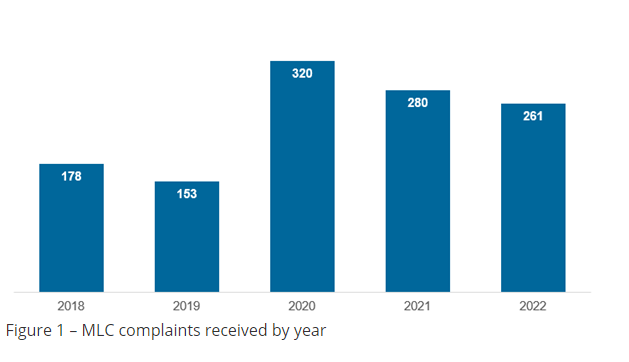
Follow up to complaints received
When complaints are received by AMSA, all necessary actions are taken to ensure the confidentiality of the seafarer making the complaint. Where appropriate, AMSA encourages resolution of complaints at shipboard level, and if this is not possible, at the flag State level. If a complaint can’t be resolved, AMSA will follow-up and may issue deficiencies or detain vessels.
AMSA has a zero-tolerance approach to breaches under the MLC and has issued refusal of access direction notices to vessels from Australian ports for systemic non-compliance with the MLC (Refusal of access list and letters of warning list). Vessels that are not operated and managed to meet applicable standards, and relevant Australian laws, pose an increased risk to seafarers, other vessels and the marine environment. Since 2018, a total of 16 vessels have been issued with a direction notice refusing them access to Australian ports. Of these 16 vessels, 13 were banned for serious breaches of the MLC primarily relating to underpayment of wages, decent working and living conditions and inadequate provisions.
An estimated amount of AUD $313, 612 in wages was recovered from vessels in 2022. In 2022, two vessels were banned from Australian ports due to MLC breaches. The reasons for the bans included underpayment of wages and inadequate provisions. The vessels were banned for a period of three to six months.
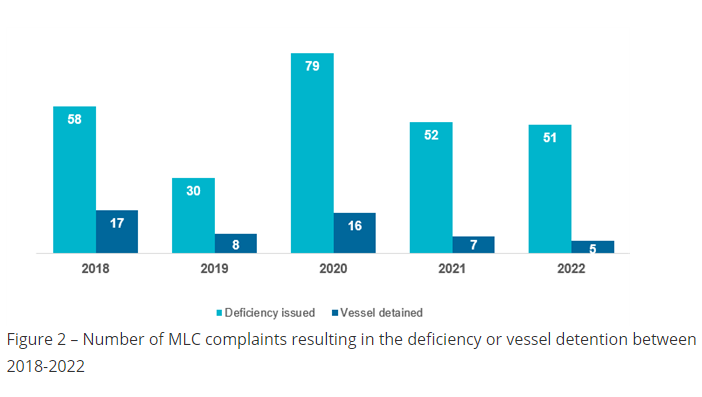
Breakdown of complaints by vessel type
In 2022, 62.5 per cent of complaints received were from seafarers engaged on bulk carriers. This is a 6.1 per cent reduction from the 2021 complaints. One of the factors that likely influenced the reduction is the decrease in bulk carrier arrivals in Australia (2.48 per cent less in comparison to 2021).
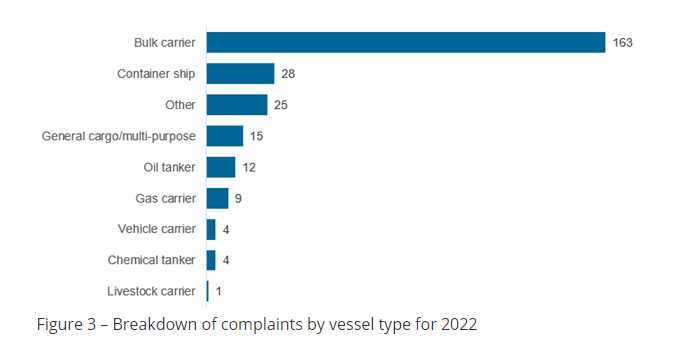
Complaints received by MLC titles
The main body of the MLC (the regulations and the code) is grouped into five main titles with data coded accordingly.
- Title 1 – Minimum requirements for seafarers to work on vessels
- Title 2 – Conditions of employment
- Title 3 – Accommodation, recreational facilities, food and catering
- Title 4 – Health Protection, medical care, welfare, and social security protection (including bullying and harassment)
- Title 5 – Compliance and enforcement
Title 2 of the MLC – Conditions of employment continues to make up the majority (56.9 per cent) of MLC complaints received. This includes seafarer employment agreements (SEAs), wages, hours of work and rest, entitlement to leave, repatriation, and crewing levels. This is followed by title 4 – Health Protection, medical care, welfare, and social security protection (including bullying and harassment) in which an increasing trend in complaints over the years is evident from the data.
Although not as significant as during Covid, the overall number of complaints, and the number of issues reported in the complaints remains significantly higher than the numbers reported pre-Covid in 2019. Complaints related to Title 4 increased from 85 (19.67 per cent of total complaints) in 2021 to 100 (24.3 per cent of total complaints) in 2022. The number of complaints continue to be a concerning issue and AMSA will continue to monitor these trends and ensure compliance with MLC is upheld by vessels coming into Australian waters.
Breakdown of complaints by outcome
AMSA endeavours to follow-up all MLC complaints—and has done so—except in cases where the vessel was out of area and has not arrived in Australia and therefore beyond the regulatory oversight of AMSA. In those situations, AMSA refer the complaint to the flag State of the vessel and/or the next port State. AMSA may also place alerts on the vessel to ensure the complaint is followed-up when it next arrives in Australia. In all cases we try to ensure that the confidentiality of the complainant is maintained. Where AMSA refers information to the flag State or next port State, we expect that similar steps are taken to ensure the confidentiality of the complainant.
